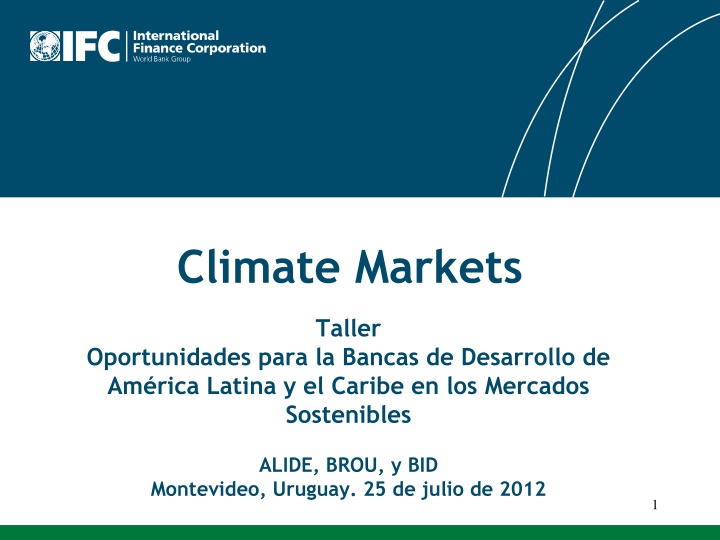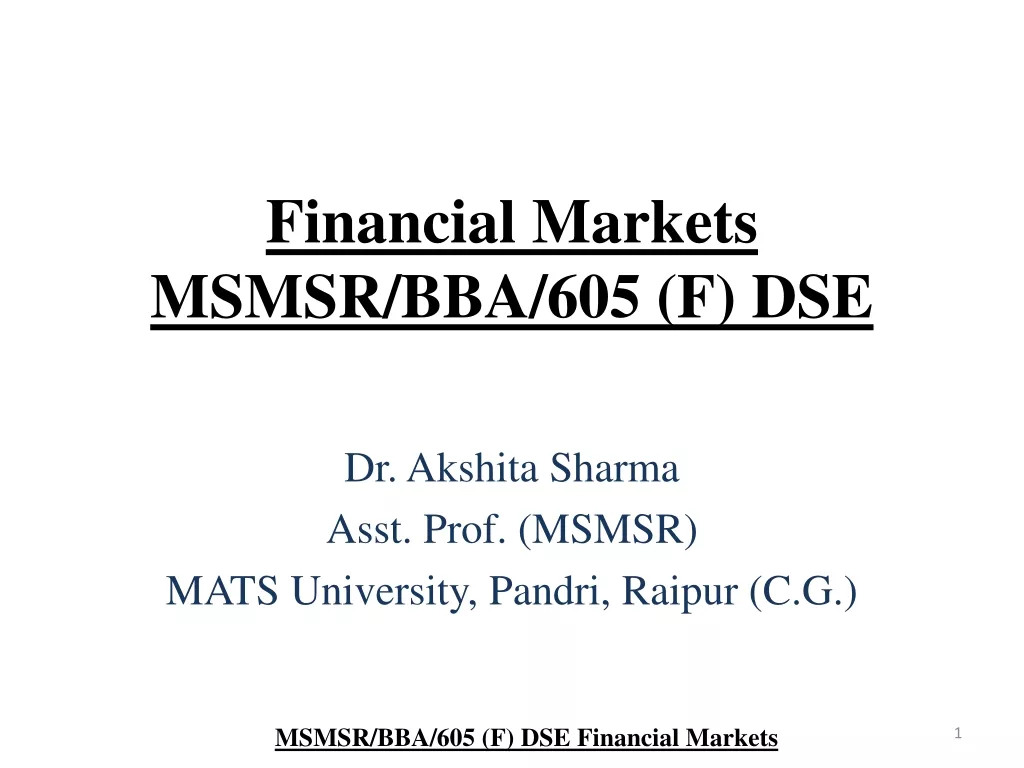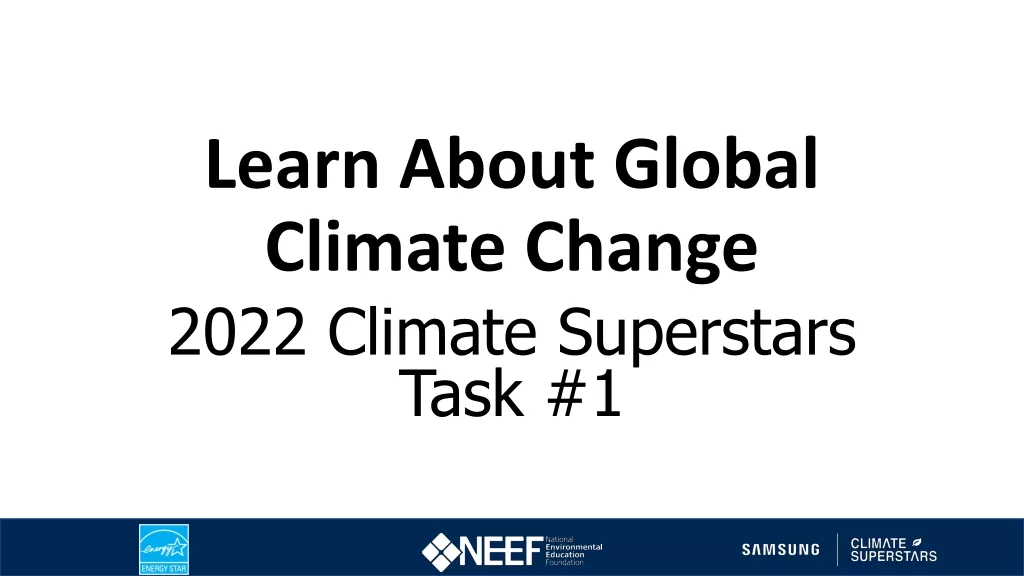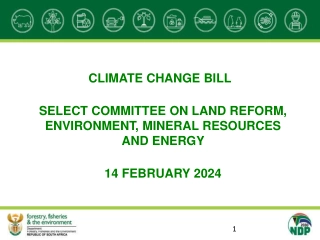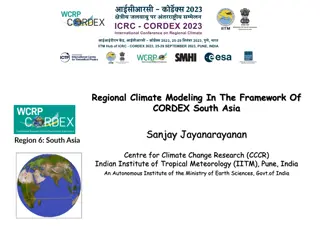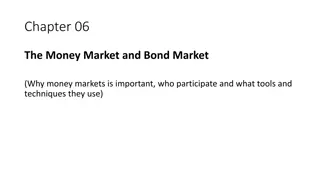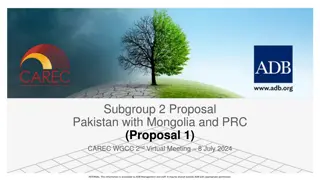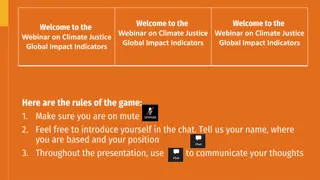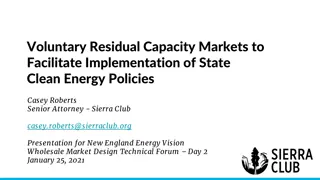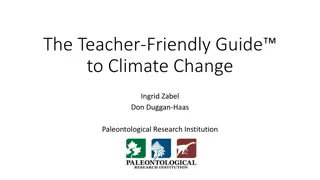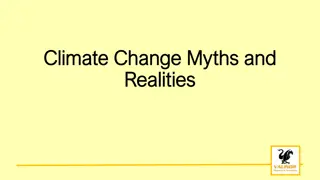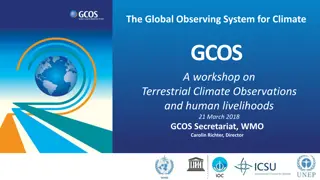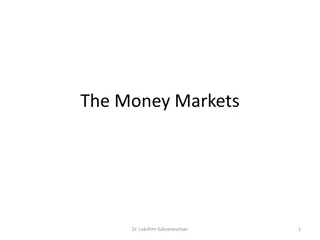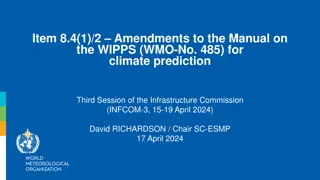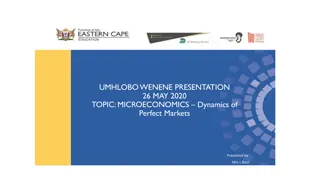Climate Markets
Climate change presents a global financial challenge, with innovations needed to mobilize private capital for climate-friendly investments. The International Finance Corporation (IFC) plays a key role in addressing this challenge through its focus on climate business solutions in various sectors such as energy, transportation, water, air, buildings, manufacturing, agriculture, and forestry.
Download Presentation

Please find below an Image/Link to download the presentation.
The content on the website is provided AS IS for your information and personal use only. It may not be sold, licensed, or shared on other websites without obtaining consent from the author.If you encounter any issues during the download, it is possible that the publisher has removed the file from their server.
You are allowed to download the files provided on this website for personal or commercial use, subject to the condition that they are used lawfully. All files are the property of their respective owners.
The content on the website is provided AS IS for your information and personal use only. It may not be sold, licensed, or shared on other websites without obtaining consent from the author.
E N D
Presentation Transcript
Climate Markets Taller Oportunidades para la Bancas de Desarrollo de Am rica Latina y el Caribe en los Mercados Sostenibles ALIDE, BROU, y BID Montevideo, Uruguay. 25 de julio de 2012 1
Climate change is today a global financial challenge Since 2009, governments broadly agree that it will be costly to solve climate change By 2020, US$100bn needed annually for investments in climate mitigation and adaptation ( Copenhagen Accord ) Governments in developed countries to play a catalytic role, but private sector in developed countries to contribute a significant portion of the US$100bn Markets, including carbon markets, are key instruments for mobilization of private capital for climate-friendly investments Strong need for innovative finance at scale to meet the climate challenge 2
Introducing IFC We create opportunity for people to escape poverty and improve their lives The world s largest private sector-focused development bank. Established in 1956, over half our 3,438 staff work from over 100 offices in 92 countries. We invest, advise, mobilize capital, and manage assets. Committed portfolio for FY11: $55.2 billion; 1,737 firms. Investments in FY11: $12.2 billion for IFC s own account, $4.7 billion mobilized. Under management within the Asset Management Company: $4 billion. Advisory expenditure for FY11: $333.8 million IFC started formal environmental and social screening of its investments in the early nineties and became the acknowledged world leader on these issues when the Equator Principles were launched in 2004. One of the biggest challenges to development today is climate change. While public policy is key, the private sector must also play a leading role. That is why Climate Business is a core priority for IFC 3
IFC has offices in over 100+ countries offering investment and advisory services Moscow Almaty Washington Istanbul New Dehli Cairo Mexico City Hong Kong Santo Domingo Dakar Bogota Nairobi Johannesburg S o Paulo Buenos Aires IFC HQ/Regional Hub IFC Hub Offices IFC Regional Operations Center IFC Country Offices 4
How does IFC define climate business? Solutions for climate mitigation / adaptation and sustainable development ENERGY: Low carbon generation, energy efficiency, storage, smart grids, sustainable energy access TRANSPORTATION: Energy efficient components, fuels and logistics WATER: Capture, treatment, conservation, wastewater treatment, access AIR & ENVIRONMENT: Carbon credits, trading and offsets BUILDINGS: Low carbon strategy, energy efficiency, sustainable materials. MANUFACTURING: Green chemicals, RE/EE supply chain, cleaner production. AGRICULTURE & FORESTRY: Land mgmt, low carbon and adaptation strategies, biomass. RECYCLING & WASTE: Recycling and waste treatment services Climate business will only scale and have impact with significant private sector participation that is where IFC has an important role to play
IFCs Climate Business Agenda Convening the private & public sector, development banks, academia and setting standards Criteria for green bonds and investment indices Thought Leadership Methodologies for carbon accounting Capacity building for private and public clients Climate risk assessments Regulatory and transactional advice Expand in new sectors, beyond renewable energy, including adaptation Business Opportunities Invest in new and transferable technologies (North-South and South-South) Develop scalable climate business models (often leveraging financial institutions and funds) Advisory services and blended finance support change by addressing regulatory, knowledge, skill and risk perception barriers Innovation Develop new climate finance products (beyond carbon finance) Develop efficient mechanisms to leverage public funds with private investment 6
IFCs Climate Business investment commitments FY05-11 ($6.5 billion) By industry MAS 26% INFRA 45% By sector FM 29% RE/EE Components 10% Green Buildings 1% Others 3% Cleantech 1% Renewable Energy 37% Funds 5% Credit lines 21% Energy Efficiency 22% 7
IFCs Climate Business investment commitments FY05-11 ($6.5 billion) By Region MENA 2% S-S.Africa 5% World 1% LAC 25% East Asia 24% (China 13%) South Asia 14% (India 13%) ECA 29% 8
IFC integrates its approach to serve Climate Businesses Climate Business Group Climate Business Department + Coordinated Communications S. Miller Global Industries Advisory Services & CES Regions Climate Strategy & Business Dev t Climate Finance & Policy Cleantech Investments Blended Finance S. Swann Africa Infra M. Landy & specialists and investment officers finance, climate, policy & metrics venture / growth stage investment officers C. Armstrong M. Broadwater V. Widge LAC 1. Strategic business dev t for RE, EE, Waste, Water, Green Buildings, Embedded IT 1. Innovation in climate finance products (inc. adaptation) CES N. Jinsi L. Da Silva MAS N. Zegger J. Graham 1. Cleantech sector expertise EMENA 2. Think tank on policy metrics (reporting, climate risk analysis, etc) Advisory Services 2. Venture/ growth capital structuring expertise FM A. Narayanan 2. Additional capacity for deal execution in new sectors J. Kellenberg E Asia 3. External engagement and thought leadership (e.g. MDBs, UNFCCC, business groups) 3. Capacity for deal execution V. Bhagat (PPP) R. Sturm (SBA) 3. Coordinated Knowledge Management S Asia P. Malhotra 9
What products does IFC offer Climate Business firms? Commercial Finance (Equity, Debt and Mezzanine) Renewable energy generation and supply chains Resource efficiency (Energy, Waste, Water) Credit lines and guarantees for Financial Institutions to on-lend to SMEs Climate Change Private Equity Funds Cleantech growth capital Carbon Finance Blended Finance Advisory Services Convening industry players for research / standard setting
blended finance IFC has a long track record in blended finance. Over a decade of innovation and more than $700 million under management from GEF, CIF, Canadian Climate Change Fund and other bilateral donors for climate. FY12: $3 billion IFC and private sector investment mobilized by $130 million in donor funds. That is a leverage ratio of~23 times. Examples of intervention types: Concessional debt to accelerate technology roll-out e.g. La Ventosa wind farm in Mexico Risk sharing facilities eg. to help lenders scale up renewable and energy efficiency portfolios, such as CHUEE in China Patient equity e.g. for young cleantech companies such as a micro-turbine manufacturer in India and an energy efficient water purification company in India, Bangladesh, Phillipines and Ghana Competition prizes e.g. for companies innovating light and energy solutions for underserved / off-grid populations. 11
advisory services Advisory services programs address barriers to market development Awareness and skills for firms: e.g. cleaner production advice to firms Capacity building for public policy makers: e.g. feed-in tariffs with IBRD Market transformation initiatives which address regulatory, skills and knowledge, and access to finance barriers simultaneously: e.g. Lighting Africa. Transaction support to demonstrate new business models: PPPs for concessions in renewable energy generation/access, energy distribution, solid waste, water, forest management Long term engagement with key market players to understand & address risk perception Product development in forestry and land-use could ultimately result in a GHG abatement impact that is larger than that achievable by IFC in the RE/EE sector Manage and deploy knowledge for replication and scale-up Best practices and lessons learned
advisory services IFC s Advisory Services approach is market-driven. IFC Advisory Services catalyze market development at various points along the innovation curve, tailoring interventions to market needs. PPP support Break-even Financial Market Development Regulatory reform Profitability Market Intelligence, Industry Standards Proof of concept Commercial Scale Up Refining Business Models 1) Support regulatory reform initiatives which set enabling environment to enable commercial investment. (eg, feed- in tariffs, green building codes) 2) Demonstration projects designed to catalyze replication at scale 1) Support innovative business models which enable technology and services to reach new markets 2) Provide market intelligence on where business opportunities exist, and on what tools/products exist to help project development 3) Support market aggregation to catalyze rapid uptake and foster competition 4) Support public private partnerships 1) Support commercial banks in developing products which underpin a sustainable commercial debt market for climate investment 2) Identify opportunities to leverage concessional funding through modified waterfalls to move commercial finance sustainably into the frontier Intervention 13 13
The carbon market opportunity Carbon markets are important tools for delivering on IFC s climate business targets going forward Carbon markets presents new business opportunities for companies and financial institutions in emerging markets Since market start-up in 2005, the total value of the global carbon market has been steadily increasing (2011=$176bn) Carbon is cross-cutting key sectors (power, manufacturing, industry, buildings, transportation, waste, ag, forestry, etc.) 14
Steady increase of global market value, US$bn 176 $180 159 Other project-based Other allowances Secondary CER Primary CER post-2012 Primary CER pre-2013 EU Allowances 144 135 $120 63 $60 31 11 $0 2005 2006 2007 2008 2009 2010 2011 Source: World Bank, 2012: State and Trends of the Carbon Market 2011.
(in Billion US$) EU and other markets increasing value Secondary CDM + JI New Zealand post-2012 CDM 2.0 N. America 0.5 0.4 23.1 +12% -18% +249% +63% pre-2013 CDM EU ETS Allowances JI AAU 1.0 147.8 0.3 0.3 -32% -36% -49% +11%
IFC has long experience in carbon finance IFC has more than 8 years of experience with carbon finance Investment activities: Manager of two carbon funds for the Government of the Netherlands. $135 million worth of carbon credits have been purchased Signed three carbon delivery guarantees for a total of 2.2 million credits In June 2011, close of 150 million Post-2012 Carbon Facility US$5M equity investment in BioCarbon (forestry-C credits) IFC also offers debt financing to projects & programmes that rely on carbon revenue from sale of post-2012 credits 17
Key features of global AS program for FIs Strategic goals: Build knowledge, tools and partnerships needed to be successful in sustainability markets Build capacity to integrate revenues into credit appraisal Support a new business line and expand client base and relationships Development of a portfolio of bankable project/program opportunities Main income streams for FIs: Provide finance to projects which generate credits Manage credit risk associated with transactions Purchase and trade credits with potential for significant returns Fee earnings from sales of credits to buyers and off-takers Provide advice on financial structuring of projects / programs generating credits 18
Advisory services program to enable FI enter sustainability markets Program aims to enable FIs to offer financial products tailored for domestic markets for environmental/sustainable development products, and carbon credits Program provides appraisal capacity, transactional support, pipeline review, and aggregation instruments for FIs in emerging markets The advisory program components could be enhanced with investments products - credit lines, First Loss, guarantees, etc. Implementation period: 2012-2014 19
Wholesaling via domestic FIs 3-pronged approach International Carbon Market Structured Carbon Products Capacity Building Direct Funding and/or Risk Sharing Facilities CER Off-take Arrangements Local Financial Institution Project D Project A Project B Project C 20
Transformation of carbon markets The global carbon market is changing Oversupply of credits in the EU Only new projects in Least Developed Countries allowed in EU post-2012 Japan pursuing bilateral approach with developing countries National carbon markets emerging in Australia, South Korea, and California is leading the US market at the regional level while new markets are emerging in developing countries DCs seem willing to take climate action at national level 15 countries have joined the World Bank s Partnership for Market Readiness DCs have put in place renewable energy portfolios (Chile), energy efficiency certificates (e.g., PAT in India) Several countries in LAC are moving towards domestic ETS: Brazil, Chile, Columbia, Costa Rica, and Mexico 21
GREEN BONDS 22
Rationale for green bonds Need for large-scale financing toll targeting investment opportunities at portfolio, sector, regional levels Responding to climate change requires implementation of interventions that require significant upfront capital investments Carbon finance is back-loaded, i.e. and payments-on- delivery/performance payments Ability to tap traditional financial markets will be key Move from single project financing towards flexible investment programs linked to markets for sustainable management, and carbon assets 23
Rationale for green bonds (contd) Need for standardized products that can tap into significant money Investment products must be attractive to mainstream bond investors (size, rate, tenure, risk rating) Asset-backed issues across a range of technologies, regions, and sectors (forestry, renewables, energy efficiency, water, etc.) Since 2006, over US$15bn have been raised through green bond issuances* * Source: Della Croce et al, The Role of Pension Funds in Financing Green Growth Initiatives (OECD, 2011). 24
Major green bond issues since 2006 Source: Della Croce et al, The Role of Pension Funds in Financing Green Growth Initiatives (OECD, 2011). 25
What IFC has done in this space so far First Green Bond issued in April of 2010. Proceeds of the four- year US$200 million fixed bond were set aside in a separate Green Account for investing exclusively in climate-friendly projects in developing countries Eight more issuances of Green Bonds have occurred, the last being in September of 2011, raising US$555 million. To date, proceeds from the Uridashi Green Bonds have supported 21 climate-related investments across 4 continents IBRD has issued US$2.5bn in green bonds stating in 2007 (retail) and 2008 (institutional). Currently one of the largest issuers. EIB has issued around 1.2bn in Climate Awareness Bonds starting in 2007. 26
Various types of bonds: Examples from forestry sector Model (A): A bond backed by government income from forestry concessions Model (B): A bond backed by a portfolio of sustainable forestry Model (C): A bond backed by sustainable forestry loans issued by local banks Model (D): A zero coupon bond backed by a sustainable forestry portfolio Source: Forum for the Future and Enviromarket: Forest-Backed Bonds Proof of Concept Study. 2007 27
Example #1 10 year bond issued by IFC Principal guaranteed by the IFC (Aaa/AAA/AAA) The bond is a IFC carbon-linked green bond. Principal proceeds are earmarked to REDD projects. Projects will reduce emissions of greenhouse gases and/or sequester greenhouse gases The coupon will be a variable coupon linked to carbon credits generated by an REDD Investment Pool. Redemption at par. Principal paid by the IFC at maturity The IFC may not guarantee the carbon credit flow under the contemplated structure 28
Indicative Structure IFC discounts the coupon over 10 yrs and receives PV of fix rate coupon USD [X]m Annual VER Proceeds USD[X]m in year 10 VER Proceeds Bond Investors Management Facility VERs Investment Committee Private FI REDD Financing Pool VER Sold Investment Committee evaluates REDD projects submitted to the REDD Investment Pool & negotiates an adequate VER/Prepayment ratio REDD Financing Pool will prepay for VERs against an off-take agreement Carbon Market Private FI manages the monetization of VERs in the carbon market REDD Project #1 REDD Project #2 REDD Project #3 REDD Project #4
Example #2 Country A Government to pass national environmental legislation, including legal framework Sustainable Development Credits (SDCs) Companies operating in Country A may use SDCs to comply with sustainability law and regulations A SPV to issue a green euro-denominated bond in capital markets to finance environmentally sustainable projects Principal and interest to be repaid to investors in SDCs recognized and registered in national system in Country A Government may offer bond buyers a floor-price for SDCs Sponsor proposal to IFC for product enhancement by addressing SDC delivery issues. 30
Determinants of success EXTERNAL ISSUES: Market terms: price, coupon, yield Demand: buyer interest Supply: availability of high-quality projects Carbon market issues: regulations, prices Competition: for buyers; for projects OTHER ISSUES: Acceptable risk Tenure, currency, etc. Standard vs. customized product IFC Internal policies Sector expertise 31
For additional information, please contact: Climate Business Group 2121 Pennsylvania Avenue NW Washington, DC 20433, USA +1 202 458 0134 carbonfinance@ifc.org www.ifc.org/carbonfinance
